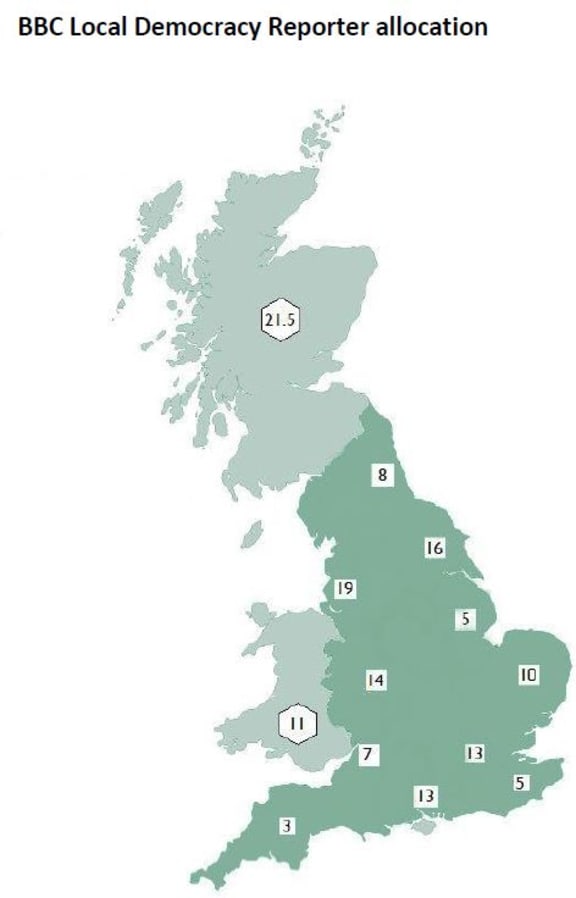Publicly funded reporters will be employed by news publishers around the country in a first-of-its-kind scheme unveiled today to address declines in local news coverage. It’s the result of a government-approved collaboration between RNZ, publishers and the government’s broadcasting funding agency.

Photo: 123rf
Eight reporters will be recruited to report local news around the country under a new scheme created by the Newspaper Publishers Association, RNZ and the government's broadcasting funding agency New Zealand on Air (NZOA).
The Local Democracy Reporting Service (LDRS) will generate news and content available to media outlets including RNZ, the country’s biggest newspaper publishers - Stuff, NZME and South Island publisher Allied Press - and small local publishers too.
One million dollars to fund the scheme comes from the $6m Joint Innovation Fund for RNZ and NZOA established by the government in last year’s Budget to create “more public media content for under-served audiences” including regional New Zealand.
While public money has bankrolled broadcasting for decades, it’s never before paid for news reporters at privately-owned media companies. New Zealand on Air has only funded broadcast news projects in recent years.
“It has become increasingly clear that New Zealanders want and need more reporting on the issues at home that affect them and the commercial market is finding it difficult to meet these needs,” said NZOA chief executive Jane Wrightson in a press statement.
How it will work
Only news organisations belonging to publishers’ umbrella group The Newspaper Publishers Association (NPA) are eligible for funding to employ a ‘local democracy reporter’ under the scheme.
The editorial director of the NPA Rick Neville said in a statement the new journalists would be required to report solely on local institutions like councils, community boards, council-owned businesses, trusts and health boards.
Reporters’ salaries will account for the bulk of the $1m fund, with the balance covering costs incurred by RNZ managing the service.
“The objective is to give the New Zealand public an independent and impartial news service on as many platforms as possible,” said RNZ chief executive Paul Thompson.
RNZ already shares its news content with more than 30 New Zealand media companies.
“This partnership with the newspaper industry is an important step forward,” said Mr Thompson, formerly chief editor at Fairfax Media (now known as Stuff).
The problem at hand
This is a response to declines in local news coverage around the country, especially in the regions where newsrooms run by publishers under financial pressure have shed reporters in recent years.
The 2001 census listed 2277 journalists working in New Zealand but in 2013 that had slumped to 1527.
“Reporter numbers in regional newsrooms have fallen by at least 152 (28 per cent) in the last 3-5 years,” the NPA's Rick Neville wrote in a piece for Stuff.
The country’s biggest news publisher Stuff closed or sold 28 community newspapers last year. Nineteen journalists' positions in Auckland and Whangārei were lost in the most recent round of cuts last November.
It has become increasingly common for local body meetings to go unreported and unattended by journalists.
Following the UK example

Photo: BBC Local News Partnership report 2018
The new scheme is inspired by a similar one established in the UK after the British government in 2016 instructed public broadcaster, the BBC, to address deficits in reporting local news there. Editors from major news media outlets, including RNZ and Stuff, travelled to the UK earlier this year to assess the scheme.
One hundred and fifty British reporters employed by regional news organisations in 60 locations have produced more than 60,000 stories so far shared with more than 850 print, online or broadcast outlets signed up to the Local News Partnerships scheme.
The BBC is proposing to launch a 'Local Democracy Foundation' in conjunction with tech companies to take over the existing scheme in future. The proposed foundation echoes the recent Cairncross review which said the UK government should provide direct financial support for local newspapers through an arms-length vehicle for public interest news.
The BBC’s scheme has been hailed as one of the world’s largest collaborative journalism efforts, but it has also been criticised because most of the reporters work for local newspapers owned by just three major publishers: Reach Plc, Newsquest, and JPI Media.
Some big regional news groups made deep cuts on local newsrooms to boost the bottom line and now use the scheme to pay for their own reporters, critics say.
Behind the scenes
The scheme has been kept under wraps until today's announcement, but key players have been signalling such a move in recent months.
RNZ chief executive Paul Thompson told Mediawatch last December the BBC scheme could be adapted to New Zealand and “we will likely develop a plan together in the next few months".

Photo: RNZ / Rebekah Parsons-King
The same month, broadcasting and digital media minister Kris Faafoi told Mediawatch he knew some media companies were going to the UK “to see how it's going, and I'm interested”.
"If we care about local news and having that coverage we have to find ways to make it happen," he said when asked if his government would come to the party and pay for it.
“We have to have discussions with public and private media entities about how we might work with (them)," he told Mediawatch last December.

Rick Neville Photo: supplied
Back in 2017, the NPA’s Rick Neville told Mediawatch the crisis in the news business was a public issue which requires a political response.
He said there was now state support for newspapers in France and Finland in response to the same sort of problems.
"The model is changing before us as we speak," he said.
Commercial rivalry between the two main newspaper publishers killed the co-operative national news agency NZPA in 2011.
Financial strain in the news industry today explains why commercial and newsgathering rivalries have been set aside to create this scheme - and opposition to the notion of state funding of newspapers in the past has been shelved for the same reason.

